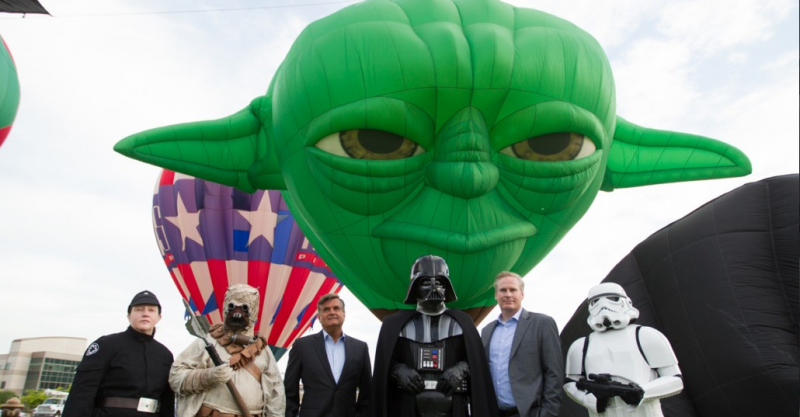 |
Salt Lake Comic Con, held annually in the first week of September, is a major science fiction and pop culture convention that brings together celebrities and fans of science fiction and fantasy fiction – such as Star Wars, Star Trek, Doctor Who, Harry Potter, Firefly, The Walking Dead and more. The attendees are well known for showing up in costume … and often in character.
And guess what … when members of the Utah Valley Astronomy Club, made up of amateur astronomers, set up a booth and held seminars, they were swamped. Well, of course.
While the bulk of the events and panels at the convention were still solidly based in the fictional world, the Utah Valley Astronomy Club held a panel on science behind the discovery of planets beyond our solar system.
The panel was packed, with even the standing room all taken up by convention-goers, said Arthur Saraiva, a member of the Utah Valley Astronomy Club. Most of the attendees seemed to be very interested in the subject matter, he said, based on the detailed questions they were asking afterwards. The slew of planets discovered over the last few years in particular drew a lot of interest, including a new Earth-like planet orbiting the closest star to our sun, he said.
The shared interest in science fiction and fantasy and real science is a natural one, he said, especially considering the recent breakthroughs in technology that are allowing scientists to validate or disprove theories pop culture creators have been coming up with for decades. Saraiva pointed to Star Wars, in which the fictional planet Tatooine orbits around two suns.
“Most people that attend comic con grew up watching sci-fi [shows],” he said. “I think a lot of sci fi is being confirmed as plausible by these discoveries, so I think that’s one of the reasons. People were asking questions about what a planet’s orbit look like around a binary star system, and that obviously comes from watching sci-fi. Discovering planets around these stars is showing that these things are plausible that were just dreamed up by authors.”
John Lundwall, a founding member and member of the board of directors of the Utah Valley Astronomy Club, pitched several more scholarly panel topics to event organizers months ago, and got the green light on two: the panel on finding planets, and another on the history of astronomy. Because Salt Lake Comic Con hasn’t had many panel discussions about hard science or hard history topics, he was unsure of how well they would go. But like the planetary discovery panel, the history of astronomy panel was a huge hit, and some people were even turned away for lack of space.
“We were as surprised as anyone. There wasn’t an empty seat in our room—it was packed. It tells me people are interested in hard science. It tells me people aren’t interested in just going to comic con and finding out what’s coming up on the next season of Game of Thrones; they want to learn how things are discovered. I think people will always be thirsty for that,” he said.
Read more: UtahBusiness.com